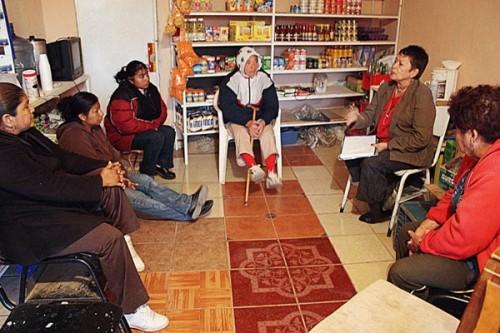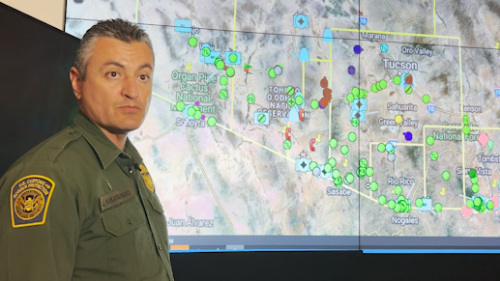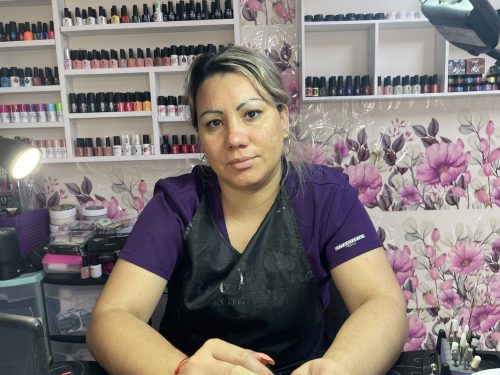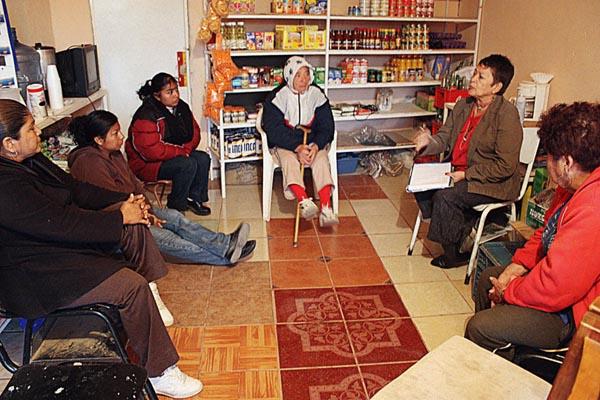 Ask Teresa Leal what she thinks of herself, and she’ll say she’s hyperactive and disciplined.
Ask Teresa Leal what she thinks of herself, and she’ll say she’s hyperactive and disciplined.
The Sonora native who lives on the Mexican side of Nogales will also say she’s a warrior.
And the 60-year-old curator and educator at the Pimeria Alta Historical Society in Nogales, Ariz., adds that she has no plans to slow down.
“I’m busy and hopefully productive, but the times are serious enough for all of us to try anything,” she says.
Leal is an active member of her community on environment and health issues, and she’s now planning her next project, in which she will work with the Binational Health Councils to examine community health issues on both sides of the border.
No doubt she’ll pull it off. There’s a certain warrior fierceness about the petite woman with a tightly cropped pixie cut who moves from a hearty chuckle to a down-to-business attitude with ease.
On this particular day, Leal is wearing long, dangling silver earrings and an olive drab green military-style jacket accented with colorful beaded necklaces. She zooms around the museum at closing time, noting that she “hates to shoo out visitors.”
And she talks about her excitement over her newest project. “We’re dealing with ending tuberculosis stigma,” she says. “It’s alive in underserved communities.”
Leal also works with Gente de I’itoi, a nongovernmental organization in Sonora that trains Indian women as peer health educators in their villages. Over Thanksgiving weekend, Leal trained four women from the Yaqui, Seri and Tohono tribes. The training took place in Magdalena de Kino.
The goal is to improve understanding of health prevention issues in displaced natives, she says.
But her work in community health service is only a small portion of the work Leal has done.
Aside from the 15 years she’s worked at the Pimeria Alta Historical Society, Leal is a well-known environmental activist who began her work as a teenager. She’s a member of the Environmental Justice Movement, which seeks to level the playing field for everyone regardless of race, nationality or socioeconomic status and seeks to protect everyone from environmental health hazards.
Leal also belongs to the Southwest Network for Environmental and Economic Justice and is the founder of Comadres (Co-Mothers), a group of American and Mexican women solving labor, environmental and economic problems that plague women as a result of factory buildup along the border.
Axel Holm, director of the Pimeria Alta Historical Society who has worked with Leal for nearly 10 years, says their relationship isn’t picture perfect and they regularly butt heads, yet he has nothing but admiration and respect for her.
“She has strong political views,” Holm says. “I don’t necessarily agree with them.”
However, Holm adds that Leal’s viewpoints come down to essential human rights.
Holm, 68, says Leal’s views on women’s rights have affected his own perceptions. He recalled a time in the ’60s when he was on a date, and the woman he was with told him women weren’t paid as much as men.
“I said, ‘That’s baloney. Why would they do that?’ But it turned out she was right.”
He said Leal has taught him to think twice before jumping to conclusions.
“As a man, you’ve got to think carefully about some of these things before you start reacting and saying ‘You’re wrong,'” Holm says.
Leal says she was drawn to environmental and humanitarian work as a child.
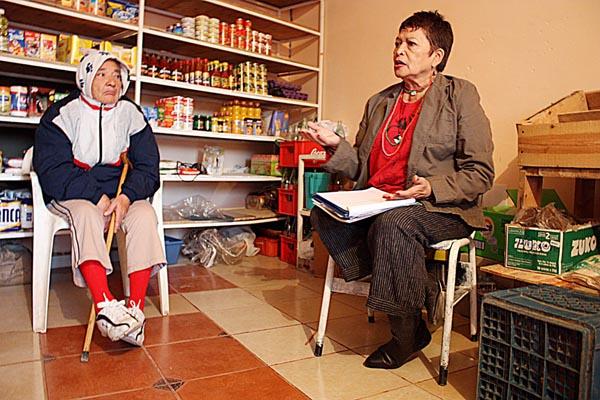
“I come from indigenous upbringing,” she says. “I remember my dad and uncle would say, ‘You have to be accommodating to your purpose in life. If something comes up and it speaks to you about how you’ve been brought up, go make yourself available.'”
Leal, whose roots are with the Opata people native to the northern areas of Sonora, says her father was a civil engineer and her uncle was a labor worker involved in the campesino rebellions of the ’50s and ’60s. She says that both her father and uncle spent time in prison.
While her father and uncle never came to the United States, Leal went to school in Tucson and was raised by her mother, a cook for Arizona politician Lewis Williams Douglas, who died in Tucson in 1974. Both Holm and Leal say that Douglas had influence on Leal’s intense independence.
“Douglas was rigid in his views, and I see that stubbornness in Teresa,” Holm says. “It’s a dimension of her character. She’s not afraid to give her opinion.”
At 16, she heard the United Farm Workers was looking for assistance from bilingual students. She approached the union and was given a job to warn female cotton workers in Sahuarita about the dangers of DDT, a pesticide that covered workers who refused to quit picking while sprayers doused the fields.
“I’d see women with babies on their backs, and I’d ask them if they were breast feeding,” Leal says. “The babies accumulated pesticides even when they weren’t in the fields. It goes through the milk and gets into the babies.”
She says workers listened to her in spite of her young age. She remembered being pleased that the generational divide didn’t stop workers from hearing her out, and in that moment, she thought it might be the start of a new gender revolution within the cultural workers’ agenda.
Leal cites her Indian roots as part of the reason for her stance.
“Perhaps that’s one of the reasons why many Indians or people of color are not attracted by the pure green movement,” she says. “It doesn’t have a ‘people’ agenda to it. It’s just preserving a pristine environment.”
Leal says there’s a connection that exists between humans and the environment, and it needs to be realistic.
“We need to learn how to live in harmony,” she adds.
Leal then became interested in supporting women and their families. The divorced mother of eight says she’s no stranger to supporting a family on a tight budget.
Leal seems resistant to the idea that it was ever a chore to raise a pack of children. The experience was “awesome,” she says. “It has a lot to do with attitude. Most challenges do. It wasn’t hard. It was a pleasure.”
Leal’s need for income to feed her large brood led to being curator of the Pimeria Alta Historical Society.
She founded Comadres in 1986 as a response to factory buildup along the U.S.-Mexico border because she wanted to create a group that fostered women supporting other women in a time when resources were scarce.
“It started coming down to things women didn’t understand about chemicals, or negotiating with the boss other than sleeping with him or being afraid to speak,” she says. “That’s what pushed us.”
Leal had the group meet in the squatter communities in Sonora where women avoided attracting unwanted attention.
Leal says that as the group expanded, it was able to hamper the way women traditionally interacted and teach them to support one another without passing judgment.
“We caught each other, compensated for each other, and we still do,” she adds. “That’s the beautiful thing.”
Leal says there are now more than three generations of women involved with the project. It’s gone beyond just work and now supports women who are victims of domestic violence, she says.
“Now we’re getting women from overcoming isolationism when they’re battered,” she says. “Many women are falling under economic struggles within the family unit, and that brings in domestic violence and things that are hard for people to walk away from.”
Leal says she loves history and knows she must keep it alive.
“This is my way, just like my ancestors did before, to pass on this history and pass on the stewardship,” she says. “And I’m not passing on something ancient. I’m passing on contemporary history to my kids.”
Joni Adamson, an associate professor of English and environmental humanities at Arizona State University, has known Leal for more than 10 years and says, “She’s like a walking encyclopedia of Mexican history and current events on the border. She is so patient when people come in and talk to her about exhibits and history.”
Adamson met Leal as part of the Environmental Justice Movement.
“She has a really positive attitude about everything,” Adamson says. She adds that she once asked Leal how she manages to keep so upbeat in her overwhelming job as an environmentalist and humanitarian.
“She told me she gets up and decides these problems are huge, but she’s going to get up and throw a rock at the sun,” Adamson says. “It probably won’t hit, but maybe if she keeps trying.”


